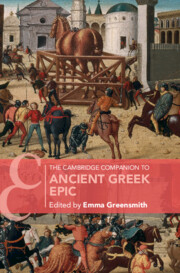Book contents
- The Cambridge Companion to Ancient Greek Epic
- The Cambridge Companion to Ancient Greek Epic
- Copyright page
- Contents
- Figures
- Contributors
- Preface
- Introduction
- Part I Epic Engagements
- Part II Epic Space
- Part III Epic Time
- Part IV Epic People
- Part V Epic Feelings
- Part VI Epic Without End
- 17 Ancient Readers of Greek Epic
- 18 Greek Epic in a Christian Empire
- 19 The Fates of Epic in Byzantium
- 20 Homeric Epic and Nation-Building in Modern Greece and Turkey
- 21 Ancient Greek Epic and the Cinema
- Epilogue
- Timeline of Ancient Greek Epic
- Bibliography
- Index Locorum
- Subject Index
- Cambridge Companions To Literature
17 - Ancient Readers of Greek Epic
from Part VI - Epic Without End
Published online by Cambridge University Press: 04 December 2024
- The Cambridge Companion to Ancient Greek Epic
- The Cambridge Companion to Ancient Greek Epic
- Copyright page
- Contents
- Figures
- Contributors
- Preface
- Introduction
- Part I Epic Engagements
- Part II Epic Space
- Part III Epic Time
- Part IV Epic People
- Part V Epic Feelings
- Part VI Epic Without End
- 17 Ancient Readers of Greek Epic
- 18 Greek Epic in a Christian Empire
- 19 The Fates of Epic in Byzantium
- 20 Homeric Epic and Nation-Building in Modern Greece and Turkey
- 21 Ancient Greek Epic and the Cinema
- Epilogue
- Timeline of Ancient Greek Epic
- Bibliography
- Index Locorum
- Subject Index
- Cambridge Companions To Literature
Summary
This chapter considers the place of epic, above all Homer, in three overlapping areas of ancient Greek and Roman culture – education at all levels, elite literary culture, and the more specialised interpretations of scholars and philosophers. Homer was central to Greek education and Hunter considers the various types of evidence for this centrality – anecdotes, literary descriptions, papyri – and the reasons for the greater attention given to the Iliad over the Odyssey. He then illustrates the place of epic in the creative poetry and prose of the Hellenistic and imperial periods and finally samples the scholarly and philosophical approaches taken to Homer from Ptolemaic Alexandria to late antiquity. The chapter brings together a range of authors and thinkers, from Quintilian to Horace, Dio Chrysostom to Eustathius, and Porphyry’s remarkable allegorical treatment of Homer.
Keywords
- Type
- Chapter
- Information
- The Cambridge Companion to Ancient Greek Epic , pp. 359 - 380Publisher: Cambridge University PressPrint publication year: 2024

